Iraqi PM Visits Tehran After Meeting With Blinken
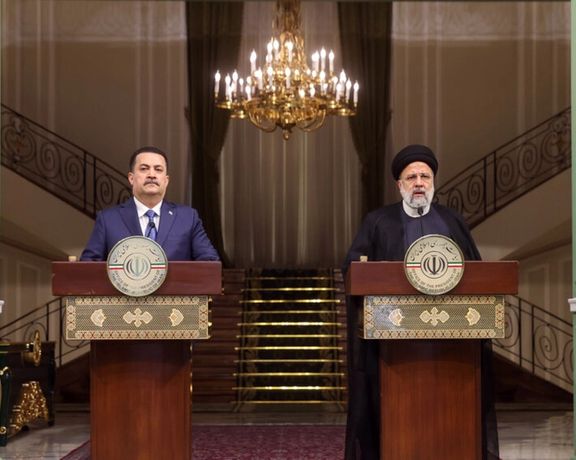
Iraqi Prime Minister Mohammed Shia al-Sudani arrived in Tehran early Monday, one day after US Secretary of State Antony Blinken visited Baghdad.

Iraqi Prime Minister Mohammed Shia al-Sudani arrived in Tehran early Monday, one day after US Secretary of State Antony Blinken visited Baghdad.
Al-Sudani was officially welcomed by president Ebrahim Raisi at Tehran's Saadabad palace, and held a joint press briefing after a meeting.
Iran’s official news agency IRNA quoted Raisi as saying that Tehran would welcome “any deterrent” measures by Islamic countries and regional states against Israel and the United States amid the conflict in Gaza.
The visit comes a day after al-Sudani met with Blinken, who visited Baghdad amid tight security following numerous drone and rocket attacks against US troops stationed in Iraq.
"It was very important to send a very clear message to anyone who might seek to take advantage of the conflict in Gaza to threaten our personnel here or anywhere else in the region: Don’t do it," Blinken told reporters after meeting al-Sudani.
Al-Sudani has pledged to pursue the perpetrators of rocket attacks on three military bases in Iraq hosting international coalition advisers, including Ain al-Asad in western Iraq, a military base near Baghdad's international airport and Harir in the northern Iraqi city of Erbil.
US forces shot down another one-way attack drone Sunday that was targeting American and coalition troops near their base in neighboring Syria, a US official said.
The US has warned it will respond to attacks by Iranian-backed groups. Iran has repeatedly called the US a "complicit" in what it describes as Israeli "war crimes" in Gaza, with Iranian foreign minister saying in late October that the US will not be "spared from this fire."

“Iran belongs to hardliners,” a recent remark on state TV, further fueled anger and frustration over the monopoly of power established by the regime loyalists.
An aspiring female hardliner politician, Mansooreh Masoumi-Asl, speaking in a television program, questioned the presence of non-hardliners on state TV, emphasizing, "This country belongs to Hezbollahis."
In the past 20 years, Iran’s so-called ultraconservatives and hardliners supported by the Revolutionary Guard and Supreme Leader Ali Khamenei have steadily increased their power in all state institutions.
Khamenei controlling all intelligence services and the courts first began closing a nascent bunch of relatively independent newspapers in early 2000s. Then he empowered the Revolutionary Guard to build an economic empire and a powerful intelligence organization. Hundreds of journalists were jailed in the past 20 years and an emerging civil society was eradicated by more arrests and court cases.
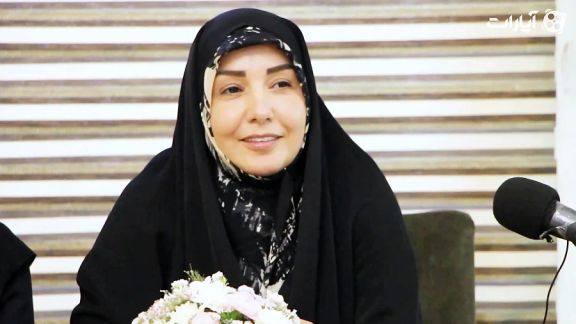
Finally, in the February 2020 parliamentary elections, most non-hardliner candidates were disqualified by the Guardian Council, a strange constitutional body tasked with vetting candidates. These individuals were already politicians loyal to the Islamic Republic, as those critical or opposed to the regime never had the chance to even express an opinion while in Iran.
The result in 2020 was that voter turnout declined, as there was no choice of so-called reformist candidates on the slates. In some districts, hardliners cruised to victory by just a few thousand votes. The same scenario happened in the 2021 presidential elections, when prominent candidates, including the former speaker of parliament, conservative Ali Larijani were disqualified and victory was handed to Khamenei’s hand-picked man, Ebrahim Raisi.
The blocking of all alternatives was part of the reason why nationwide anti-regime protests broke out in September 2022, which scared the core of the regime for a few weeks until mass killings and arrests re-assured them of their control over the angry populace. Immediately after control was restored the hardliners began a political “purification” purge by expelling scores of university professors, banning artists and writers and even replacing 20,000 school directors.
Regime insiders who are considered ‘reformists’ began sounding the alarm that most voters will not go to the ballot boxes in March, when a new parliament is scheduled to be elected. Many demanded assurances that the Guardian Council will not again block non-hardliners and allow some measure of competitive elections. But so far, the regime has offered no assurances.
The latest plea was heard from Mohammad Sadr, a long-time regime insider, who told Aftab News on Sunday that hardliners are harming the Islamic regime by their tribal behavior. “It is a fact that a high level of voter participation will boost the regime’s legitimacy,” ha argued and added, “and any group, organization or individual who prevents higher voter turnout, in reality is inflicting blows against the regime.”
Many commentators and reformists have argued that hardliners actually prefer to see voter apathy, because low turnout will ensure their victory in the elections.
However, even reformists are no longer seen as a viable alternative because it has been demonstrated in the past two decades that it is the radical core of the regime which makes all key decisions. Even a reformist parliamentary majority will be condemned to inaction by various pressures orchestrated by Khamenei’s office and the IRGC, pundits have said.
Mostafa Rostami, Khamenei representative in universities recently said that an opinion survey showed 83 percent of the population strongly object to the existing conditions in the country, although they did not participate in recent protests. Others have warned that in the next round of unrest there is no guarantee that the silent majority would remain silent.
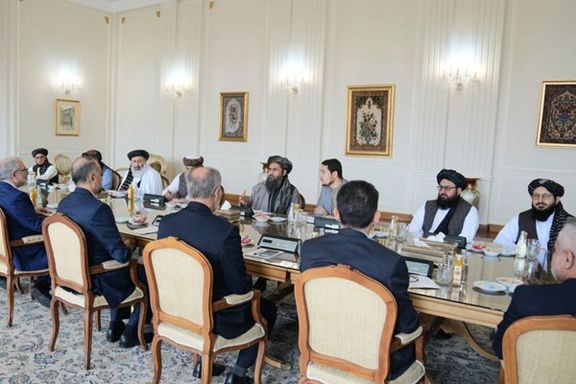
Amid impasse on issues such as migrants and water rights between Iran and Afghanistan, a 30-member Taliban “economic delegation” arrived in Tehran on Saturday.
The Afghan delegation is led by Abdul Ghani Baradar, First Deputy Prime Minister for Economic Affairs of Afghanistan and a co-founder of the Taliban along with Mullah Omar.
According to Afghan sources, the delegation, consisting of 30 Taliban officials, were to hold talks with Iranian authorities on trade, transit, transportation, infrastructure, and railways, as well as regional development and the issue of the growing number of Afghan migrants in Iran.
Iran’s capital Tehran hosted the delegation in the framework of an Iran-Afghanistan Joint Economic Committee meeting, the first after Taliban took over Afghanistan in 2021. Iranian Agriculture Minister Mohammad-Ali Nikbakht and President Ebrahim Raisi’s special envoy for Afghanistan Hassan Kazemi-Qomi were among the senior officials representing the Iranian side.
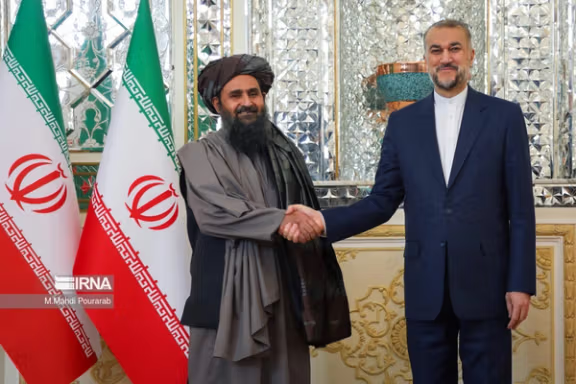
There is little concrete information about the outcome of the meetings, except calls to bolster relations and facilitate trade. However, among the more pressing issues in Tehran-Kabul ties are the issue Afghan migrants in Iran and water rights in eastern Iran, especially over Hirman/Helmand river that is the main source of irrigation water in western Afghanistan and eastern Iran. According to Iran’s state media the two parties agreed to form several taskforces to follow up on the issues of mutual interest.
Amid the escalating Hamas-Israel conflict, the visit by the Afghan delegation can also be related to security issues. Baradar also held a meeting with Iran’s top security chief Ali-Akbar Ahmadian, the Secretary of the Supreme National Security Council and a close aide to the Supreme Leader. "Afghanistan will not pose a threat to any of its neighbors," the Taliban official said according to IRNA.
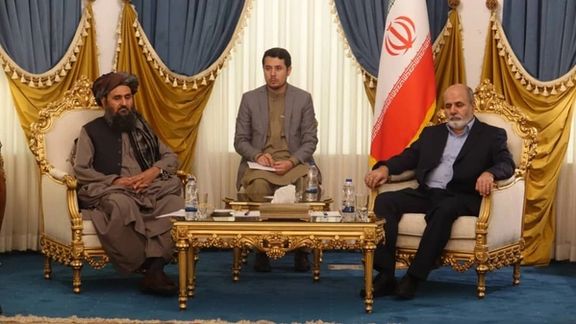
In August, an Iranian parliamentary delegation visited Kabul to address the water crisis in Sistan and Baluchestan, stemming from Taliban's Helmand River flow obstruction. Iran says that the Taliban have restricted the water flow to Iran's parched eastern regions, but this accusation is denied by the Taliban.
In the past few weeks, the the Iranian government’s critics have repeatedly warned about its “open borders” policy and the possibility of a hidden agenda, with hardliners responding to such criticism by accusing critics of inciting “Afghanophobia” amid fast-growing anti-Afghan sentiments on social media and violence against the immigrants.
The Islamic Republic adopted an unprecedentedly lenient approach to Afghan migration when hardliner President Ebrahim Raisi took office in Iran two years ago and the Taliban formed a government in neighboring Afghanistan.
Some government critics claim authorities are actively encouraging illegal Afghan immigration to remedy the problem of population decline or even to bolster its military by recruiting young Shiite Hazara Afghans.
The IRGC-linked Fars news agency has accused a “shadowy political group” of seeking to cause tension between the Islamic Republic and the Taliban by expressing concerns about the increase in the number of Afghans in Iran.
As the debate intensified, Iran's interior minister insisted that the number of Afghans has reached 5 million, but others in local media countered that the refugees are as many as 8 million or even higher. That would be around 10 percent of Iran's population.
In April 2021, Foreign Minister Hossein Amir-Abdollahian said one million more Afghans had entered Iran since the Taliban took power in August the previous year, bringing Iran’s official number of refugees and economic migrants to five million.
In a commentary in July, Aftab News, a website close to former President Hassan Rouhani and the moderate conservative Moderation and Development Party, warned that “the massive increase in the number of Afghans” is the result of authorities' active policy to encourage the growth of the Afghan population including allowing them the right to buy property and access to services such as education and healthcare.
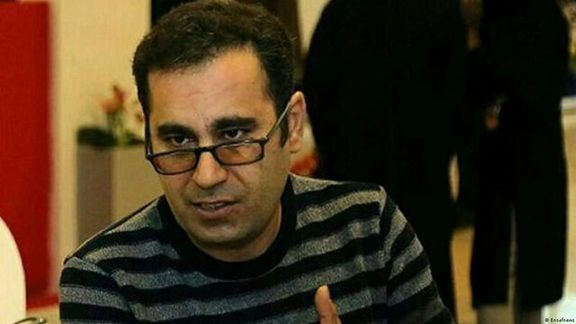
Mohammad Habibi, the spokesperson of the Teachers' Association of Tehran, is to stand trial for protests against the poisoning of female students.
The Coordination Council of Iranian Teachers' Trade Associations declared on Sunday that the trial begins on January 10 in the second branch of the Revolutionary Court in Shahr-e Rey.
The charges against him are "participation and collusion in committing a crime against domestic/foreign security".
Habibi, known for his involvement in cultural and educational activism, was detained in April by Ministry of Intelligence officers. He was released more than a month later after posting bail from Evin Prison's Ward 209.
The chemical attacks on girls' schools began in November 2022, affecting hundreds of schools and thousands of students.
In the initial months, the Islamic Republic denied the chemical attacks on schools. Later, they downplayed the incidents, shifting blame onto the students for the poisonings. Simultaneously, there was an increase in pressure on the media and civil activists to curtail information dissemination on the matter.
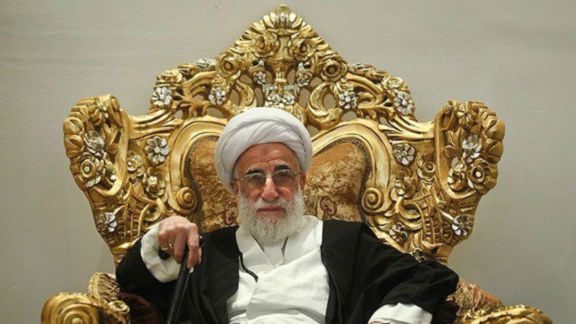
The second wife of Ahmad Jannati, the Secretary of the Guardian Council and the Chairman of the Assembly of Experts, passed away on Sunday night.
Her death was confirmed by one of her close associates and was attributed to a heart attack that occurred while she was sleeping.
Keeping the relationship less public than his first marriage to Seddigheh Mazaheril, who passed away in 2016, the name of Jannati's second wife was kept under wraps.
In 2018, Ali Jannati, Ahmad Jannati's son and a former minister during the Hassan Rouhani administration, announced his father's remarriage, citing his father's desire to combat “loneliness.”
At 97 years of age, Jannati is widely recognized for his unwavering opposition to reform initiatives within Iran.
The centenarian cleric holds the distinction of being the oldest official in Iran, and his remarkable longevity in both life and politics often becomes the subject of humor.
Social media users have playfully teased Jannati, humorously speculating about how many wives he might outlive before his own death.
Jannati's steadfast loyalty to Supreme Leader Ali Khamenei positions him among the most enduring and influential politicians in Iran, almost acting as a proxy for Khamenei, enabling the Supreme Leader to distance himself from the responsibility of disqualifying election candidates he opposes.
On July 19, Jannati was reinstated as the Secretary of the Guardian Council, prompting discussions about his continued ability to maintain his career for yet another year after serving in the same role for an impressive 31-year duration.
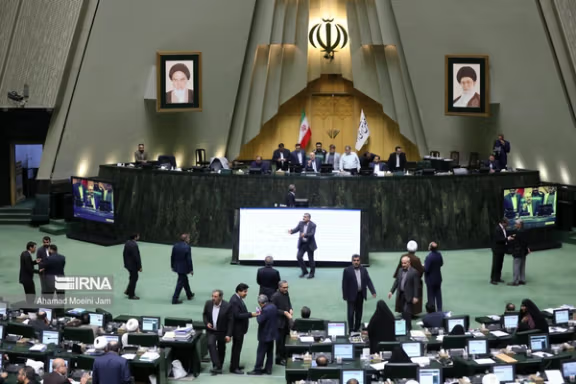
Iran's new development plan envisions granting foreign policy authority to the armed forces, nuclear agency, and intelligence ministry, separate from the foreign ministry.
As lawmakers are reviewing the country’s Seventh Development Plan, small amendments of the new plan are revealing nuances in the regime’s long-term policy orientations.
The administration of President Ebrahim Raisi submitted its Development Plan to the parliament last month. After lawmakers refused to approve the initial proposed draft, apparently for being too general and vague, the administration practically extended its expired development plan for the third time since 2021 with a few amendments and called it a new plan. The old document, the 6th Development Plan, was to be implemented between 2016 and 2021, but many parts of it have remained untouched as the government lacked the appropriate resources due to a catalogue of foreign policy and economic problems.
Through amendments to the roadmap, which works as a compass for all the state bodies, the administration seeks to de-nationalize the oil industry to cover for its debts and increase even more control over the private sector, already a tiny portion of Iran’s economy. More than 80 percent of Iran's economy is controlled by the clerical regime, including the Revolutionary Guard, leaving little room for real businessmen or private companies to flourish. However, the amendment on the foreign policy was not included in Raisi’s proposed draft and was added by the parliament.

According to an article on the general policies of the Seventh Development Plan "for active engagement in official and public diplomacy, the country's executive institutions (with the exception of the armed forces, the Ministry of Intelligence, and Atomic Energy Organization of Iran) are required to carry out all their actions in the field of foreign relations in coordination with the Ministry of Foreign Affairs.”
Coordination with the Foreign Ministry is not new but one somewhat peculiar addendum is the exemption of the three bodies from the need to coordinate with the Ministry of Foreign Affairs for conducting foreign relations.
The general policies for development plans are issued by Iran’s ruler Ali Khamenei and then the administration devises executive plans to actualize Khamenei’s decree. The parliament is then tasked with checking the details to see if the plans are consistent with the Supreme Leader’s orders and the constitution. The end result still needs final approval from the Guardian Council, a Khamenei-appointed and constitutionally mandated 12-member council that has a veto power over legislation passed by the parliament.
Although the Foreign Ministry and the Intelligence Ministry, as well as the country’s nuclear agency are legally part of the administration, Khamenei has direct oversight on their work. He is also the chief commander of the armed forces, which itself is spread through several military bodies such as the traditional army and the Revolutionary Guards. All these bodies are ultimately ruled by the Supreme Leader, therefore envisioning separate autonomy for foreign relations can be aimed at diversifying the regime’s official stance regarding global developments.
Faraz Daily, a website not directly controlled by the government, says the move will “weaken” the foreign ministry. “The change that the parliament has made in Article 100, exempting three important institutions from coordination with the Ministry of Foreign Affairs, can potentially lead to chaos in foreign policy,” Faraz Daily said on Sunday.
Parallel organizations are not something new in Iran’s politics, already having several intelligence institutions, but parallel foreign relations bodies can help Iran keep its hawkish anti-Western stance without strategic retreats while simultaneously pursuing diplomacy with the world. This new shift in the regime’s foreign policy is in line with Khamenei’s dictum that “diplomacy and battleground” are two complementary things which do not negate each other.